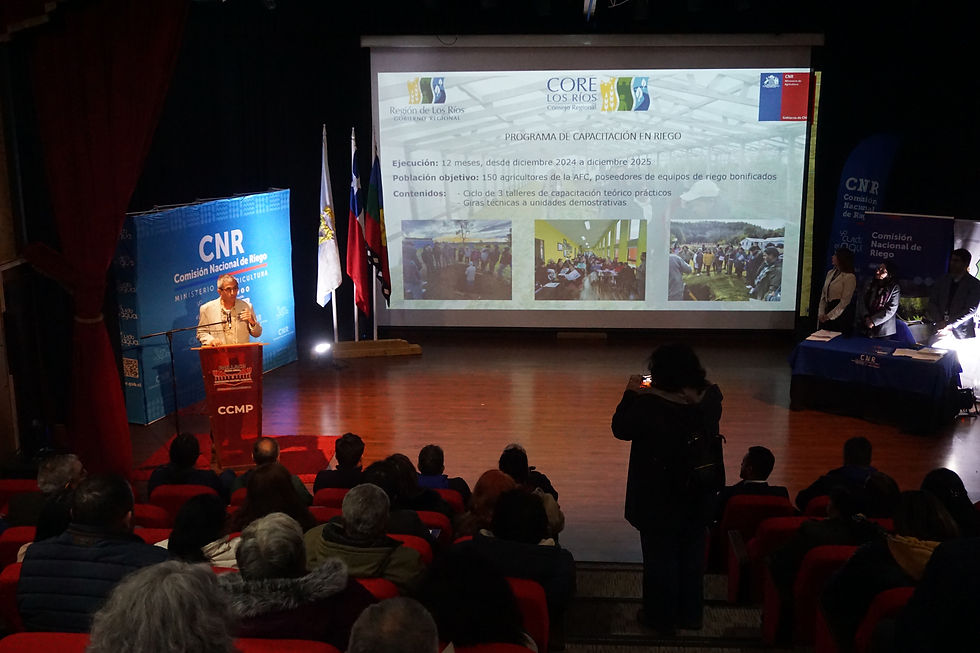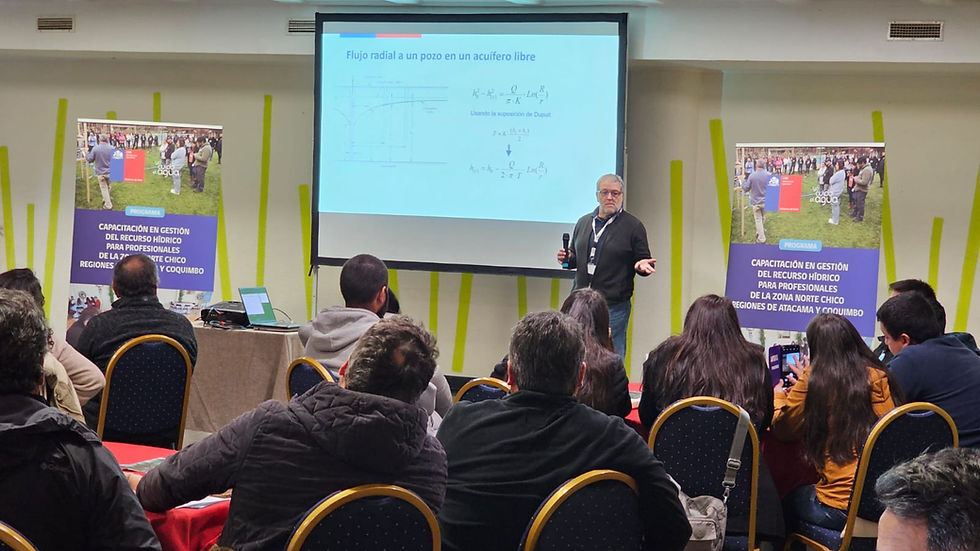Katherine Smitmans, Agriculture Engineer: “It's always important for me to know what I'm talking about”
- Gabriela Marilicán - Periodista
- Jun 26
- 6 min read
Updated: Jul 21
Water scarcity and the climate crisis have necessitated the search for new water resources to better manage water consumption. Technology has advanced by leaps and bounds, and irrigation is paramount for farmers, which is why courses and training are offered on this topic. Katherine is one of them.

When Katherine applied for the Advanced Irrigation Diploma, she assumed she'd been put on the waiting list and went straight to look for her ID number on the list, but when she saw her name wasn't there, she knew inmediately she'd been selected. "I looked up the entire waiting list, and my ID number wasn't there, and it was like, 'So I'm in.' I went to the official list, and there it was", she exclaimed.
Katherine Smitmans is an Agricultural Engineer. She studied at Inacap University in Santiago. She currently lives with her family in Purén, La Araucanía region, while working at WiseConn, an agriculture and irrigation technological company. She is 27 years old and always knew she wanted to study something related to agriculture.
“Within my family, I have my maternal great-grandfather who was a farmer in the Elqui Valley and an uncle who is also a farmer. And well, deep down, in high school, I wanted to study agriculture because I always loved the countryside, animals, and crops,” Katherine shared.
She has always loved the countryside, but she confesses that she had never started a garden before applying to university or while she was a student. She didn't raise any animals either, but she was close to horses because her father liked them. However, she was always close to the world of agriculture, because where she lived in La Araucanía, in a rural area, her neighbors farmed, and she watched them closely.
With a smile from ear to ear, Katherine recalls with a laugh the field trips her undergraduate degree included at her university's demonstration plot in La Pintana. She longed for those trips, as they were an opportunity to apply what she'd learned, to ask questions, and to explore her knowledge by getting her hands dirty. "I was always searching, looking, taking photos of everyone, talking to the case managers, to the people in the fields, or going to see the crops," she said.
“I was always asking, like, 'Hey, could you take me to the field, can you give me a ride?' What crop is it? How old is it? What's the production called? How was it this year? Who do you sell to? How’s the irrigation like? Where do you get the water from? I was always asking about yields. So, as always, asking everything,” Katherine adds.
Irrigation or fruit trees?
After graduating, she completed her internship on a dairy farm in Puerto Varas. In a conversation with her boss, he asked, "So, what are you going to do now? After you finish your internship" Undecided, unsure of what to pursue, Katherine shared that she plans to specialize in fruit or irrigation.
To which the agricultural engineer hesitantly replies that she doesn't know what to specialize in when he brings up the option of dedicating herself to irrigation. "He motivated me even more to direct my decision towards irrigation, towards the irrigation diploma," Smitmans explained.
After this confession, her boss gives her information about diplomas related to the subjects she wants to specialize in. This is why she chooses the "Diploma in Advanced Irrigation" offered by the Water Technology Consortium (COTH2O) in conjunction with state entities and the University of Concepción (Udec). This course is taught in person in the Araucanía region by Udec professors and agricultural researchers.
The diploma program seeks to train professionals who develop the ability to apply water resource management techniques and tools, enabling more efficient use and thereby achieving higher production.
Octavio Lagos, the program director and COTH2O director, explains that the creation of this diploma program stems from a need to train professionals in advanced irrigation systems in the Araucanía region. "It covers topics such as irrigation fundamentals and the design of technical irrigation systems. It's not an easy diploma program, but with the enthusiasm of all the students and faculty, the skills for which it was designed are achieved," the director explained.
Following the completion of this diploma program, a new diploma program was created and is currently being implemented in conjunction with CORFO in La Araucanía. It is designed to be more practical, where theoretical topics are applied in the field.
“We believe that, as a Water Technology Consortium, these initiatives are very necessary for the region. Extreme events such as drought and climate change put greater pressure on the area's water resources,” said Octavio Lagos.
“It's always important for me to know what I'm talking about,” Katherine says. “Especially if you're going to get into irrigation, you have to understand hydraulics, you have to understand how a pump works, you have to understand fittings, you have to understand drippers, topography, and location.” What she learned in the diploma program helped her stay up-to-date and remember what she learned at university.
The professors who taught the courses in the diploma program helped her learn about new technologies related to irrigation management. “It helped me a lot to learn about new applications in irrigation, and I also believe it's important not to fall behind, not to stick to the conventional, but to keep pace with technology, which is advancing at a rapid pace these days. And you must jump on that bandwagon, because you can't stay behind,” she adds.

Being a woman in a man's field
“The man said, 'Okay, I'm not going to teach the women how to operate the water pump because it'll be a waste of time, you won't be able to. So, all the men come and operate the water pumps,'” Katherine commented. She shares this anecdote with a look of disgust after seeing a video where a man made that comment after delivering water pumps to women in a rural area in the ninth region.
When she started studying Agricultural Engineering, there were about five women students in her entire class, including her. So, from the start, she knew she was in a field dominated by men. She was reminded of that again when she saw this video. “And you know what? It really bothered me,” Katherine says, frustrated. “I was like, 'Oh, what did you think?’
In addition to completing the Advanced Irrigation Diploma, she has also participated in courses offered by the National Irrigation Commission (CNR). She recalls that the last training she attended with this organization was exclusively for agricultural women. "I appreciate it, and I like to see that they are focusing all their resources on training women."
But she says she was prepared for some malicious comments or for people not listening to her because she is a woman. So far, that hasn't happened, and she is grateful for that.
New beginnings
Katherine currently works at WiseConn, an agricultural technology company that states on its website that it “is a complete automation solution that promotes sustainable agriculture with precision irrigation, offering cloud-based automation managed through a mobile app or the web.”
WiseConn is also a partner company of the Water Technology Consortium and has helped researchers by providing technology and resources to implement research projects conducted at the center.
Katherine is Customer Care and Sales for the southern region, where she sells and trains node equipment. Some nodes are irrigation booth controllers; others are weather stations for opening and closing valves. They also include soil moisture probes for fruit trees and pastures, among other irrigation management technologies.
“What I see are client requirements for training,” Katherine adds. “Maybe there's something they don't understand on the platform, so we schedule an online training session. It could be for the platform or the phone app.”
She smiles as she talks about how it was to work with WiseConn. “The truth is, the job offer came to me,” she says. “I received a message from this friend, and I also received one from somewhere else. It wasn't just one person who sent me the offer. And they were always encouraging me, like, 'Hey, apply, hey, it sounds like you',” and so she applied. After a long period of interviews and waiting, she was selected to work at the company.
"I'm learning a lot these days, learning how telemetry works, and the equipment WiseConn has to make it work," she added. She also comments that they've given her the opportunity to continue learning about concepts she'd only heard about before but hadn't delved into.
She's happy, Katherine says, and you can see it on her face, with a smile from ear to ear, talking excitedly about her job, her career, when she remembers the conversations, her teachers had that guided her to follow the path of irrigation.
"I've felt welcomed, very comfortable, and eager to boost irrigation and for more farmers to get on board with this technology, the telemetry that really helps," Katherine emphasized.



Comments